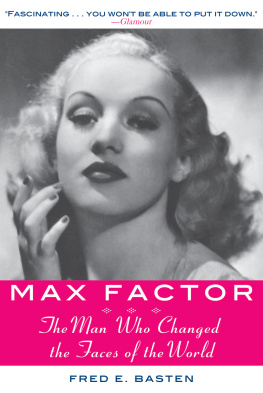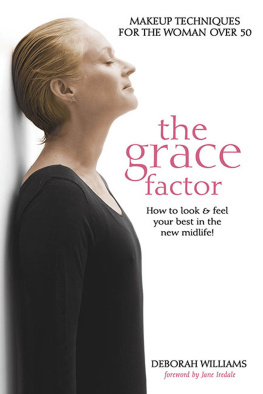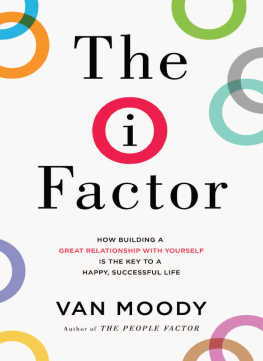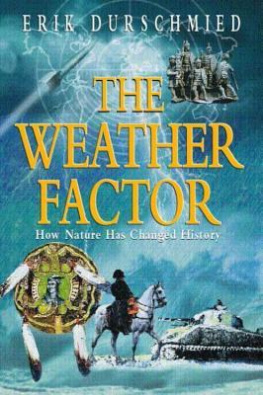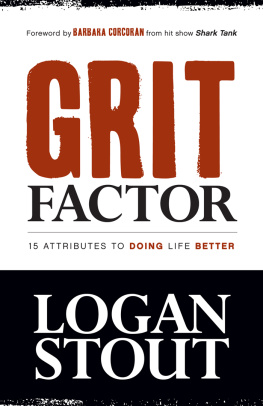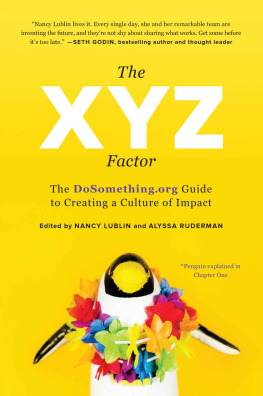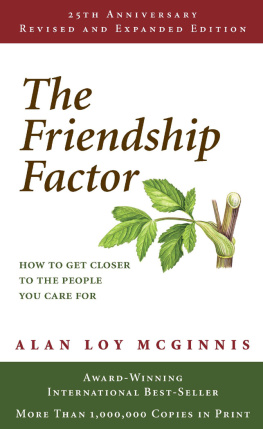Max Factor Co. - Max Factor: the man who changed the faces of the world
Here you can read online Max Factor Co. - Max Factor: the man who changed the faces of the world full text of the book (entire story) in english for free. Download pdf and epub, get meaning, cover and reviews about this ebook. City: London;New York;United States, year: 2012;2008, publisher: Arcade Publishing;Arcade, Constable & Robinson [distributor], genre: Non-fiction. Description of the work, (preface) as well as reviews are available. Best literature library LitArk.com created for fans of good reading and offers a wide selection of genres:
Romance novel
Science fiction
Adventure
Detective
Science
History
Home and family
Prose
Art
Politics
Computer
Non-fiction
Religion
Business
Children
Humor
Choose a favorite category and find really read worthwhile books. Enjoy immersion in the world of imagination, feel the emotions of the characters or learn something new for yourself, make an fascinating discovery.
- Book:Max Factor: the man who changed the faces of the world
- Author:
- Publisher:Arcade Publishing;Arcade, Constable & Robinson [distributor]
- Genre:
- Year:2012;2008
- City:London;New York;United States
- Rating:5 / 5
- Favourites:Add to favourites
- Your mark:
- 100
- 1
- 2
- 3
- 4
- 5
Max Factor: the man who changed the faces of the world: summary, description and annotation
We offer to read an annotation, description, summary or preface (depends on what the author of the book "Max Factor: the man who changed the faces of the world" wrote himself). If you haven't found the necessary information about the book — write in the comments, we will try to find it.
Max Factor: the man who changed the faces of the world — read online for free the complete book (whole text) full work
Below is the text of the book, divided by pages. System saving the place of the last page read, allows you to conveniently read the book "Max Factor: the man who changed the faces of the world" online for free, without having to search again every time where you left off. Put a bookmark, and you can go to the page where you finished reading at any time.
Font size:
Interval:
Bookmark:
MAX FACTOR
MAX FACTOR
The Man Who Changed
the Faces of the World
FRED E. BASTEN

Copyright 2008, 2011 by Fred E. Basten
All Rights Reserved. No part of this book may be reproduced in any manner without the express written consent of the publisher, except in the case of brief excerpts in critical reviews or articles. All inquiries should be addressed to Arcade Publishing, 307 West 36th Street, 11th Floor, New York, NY 10018.
Arcade Publishing books may be purchased in bulk at special discounts for sales promotion, corporate gifts, fund-raising, or educational purposes. Special editions can also be created to specifications. For details, contact the Special Sales Department, Arcade Publishing, 307 West 36th Street, 11th Floor, New York, NY 10018 or info@skyhorsepublishing.com.
Arcade Publishing is a registered trademark of Skyhorse Publishing, Inc., a Delaware corporation.
Hooray for Hollywood, words by Johnny Mercer, music by Richard A. Whiting 1937 (Renewed) WB Music Corp. All rights reserved. Used by permission of Alfred Publishing Col, Inc.
Visit our website at www.arcadepub.com.
10 9 8 7 6 5 4 3 2 1
Library of Congress Cataloging-in-Publication Data is available on file.
ISBN: 978-1-61145-135-1
Printed in the United States of America
To Robert Salvatore
I n writing this popular biography of Max Factor, the great cosmetics pioneer, I was fortunate to have complete access to the Factor archives: letters, scrapbooks, photos, and other biographical material, as well as company memos, sales bulletins, vintage newspaper and magazine articles, and so much more. All quotes in this book are taken from various sources in the archives.
Max Factor spoke in heavily accented English, and in interviews that date from prior to the mid-1920s, his words were transcribed phonetically (is became iss, maybe became mebbee, people became pipple, and so on). In the interest of clarity, I have cleaned up Max's words so readers can focus on his meaning rather than on his accent and poor grammar.
One word Max always said clearly was make-up, and from the moment he coined it, he spelled it with a hyphen. In deference to Max, that is how I have spelled the word throughout this book.
I worked for Max Factor and Company many years ago, as assistant to Len Smith, who was the head of the public relations department. It was a dream job: meeting and greeting visitors, sales representatives, dealers, and even dignitaries from around the world, showing them Hollywood, taking them to the studios to see movies being made, and introducing them to the stars. Max was no longer alive, but his spirit was everywhere. And the mere mention of his name triggered the most wonderful responses from everyone.
The year 2009 marks the hundredth anniversary of the company Max Factor founded. This book is a tribute to the man who came from near-poverty in Russia to become the very embodiment of the American dream.
MAX FACTOR
O n a winter night in February 1904, twenty-seven-year-old Max Faktor huddled with his wife and three young children in a Russian forest, frightened more for the family he had kept secret for nearly five years than of the wind and snow or even the approaching czar's men calling his name. Only days earlier, Max Faktor was a favorite of the royal family and was esteemed by the royal court. Now he was being hunted as a fugitive.
Born in 1877 in Lodz, Poland, a town southwest of Warsaw with a developing textile industry, Max was one of ten children of Abraham and Cecilia Tandowsky Faktor. He never really knew his mother; she had died when he was a toddler. His father, a textile mill worker, worked long hours and was seldom home, so Max was raised by his older siblings. Little is known about his formal schooling, if indeed he had any. He did, however, have a Hebrew education presumably at shul, studying the Talmud and Michnah which he often neglected to help with the family finances. Although young Max dreamed of being an artist, at the age of seven he sold oranges, peanuts, and candy in the lobby of the Czarina Theater in his hometown, a job he later called his introduction to the world of make-believe.
A year later Max worked as an assistant to a local apothecary, a man who not only supplied remedies, potions, and pills to the sick and ailing but provided dental care as well. When Max told his siblings about the things he was seeing and touching, they made faces and turned away in disgust, but Max was fascinated and eager to learn more.
Soon after his ninth birthday he apprenticed to Lodz's leading wigmaker and cosmetician. For four years he trained in tying and weaving human hair into wigs, creating coiffures, and compounding and applying make-up, using local actors as models. Catering to loveliness, as he put it, was Max's first full-time job.
It gave him the experience he needed to join the staff of the famed hairstylist and make-up creator, Anton of Berlin. Max's time with Anton soon led him to Moscow, where at age fourteen he was attached to Korpo, wigmaker and cosmetician to the Imperial Russian Grand Opera. For the next four years he traveled from city to city as make-up artist to some of the greatest operatic singers of the time. Whenever the company performed for Czar Nicholas II and the royal family, as well as other nobility, the temperamental opera stars insisted they look their absolute best. Max remembered being stormed backstage before royal performances, as each demanded to be made beautiful. Max worked calmly and quickly despite such pressure. Luckily, he was ambidextrous and equally skilled at using either hand. The performers usually met with royal approval. But not always.
The teenager was the company's scapegoat, no matter what went wrong. If the tenor missed his cue, Max's make-up was to blame. If the diva's performance was off, perhaps her eyebrows hadn't been arched to her liking. If the conductor misplaced his score, it was because Max had kept him waiting. As the months wore on, Max was saddled with even more responsibilities: hair-dresser, prop boy, valet, gofer. His easygoing nature was often tested to the extreme, but Max took it all in stride. He was gaining valuable experience working with professionals and having his work admired by royalty.
Max remained with the Imperial Russian Grand Opera until his eighteenth birthday, when he was required by law to serve four years in the Russian army. Max wished to continue his theater work within the military, but the decision wasn't his. The first day they picked me for the Hospital Corps, he recalled. I was like a trained nurse. The doctor prescribed and I did the work. I did not like it but I learned much. He learned to bleed patients with cups and leeches and all he'd ever need to know about phrenology and skin disorders. During his years away his father remarried and his stepmother gave birth to a son they named John Jacob.
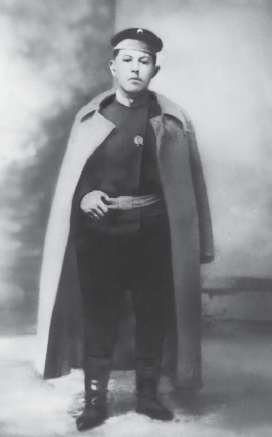
Max in his Russian army uniform, ca. 1890.
When Max's military service came to an end, he opened a small shop just outside Moscow, in the suburb of R'azan. Finding available space not far from the town square, Max, at twenty-two, became a proprietor, making and selling his own creams, rouges, fragrances, and wigs. For the first time in his life, he was working on his own and enjoying the responsibility and newfound freedom of being a shopkeeper. But all that changed when a traveling theatrical troupe passed through R'azan and a member of the company stopped at his little shop to buy some make-up. Unknown to Max, the troupe was on its way to Moscow to entertain the imperial family. Within weeks, Max's business took a royal upswing in sales and he was adopted by the summer court. It wasn't long before he was the cosmetician not only to Alexander Nicolaivich Romanoff, uncle to Czar Nicholas II, but also to the czar's personal physician and once again the Imperial Russian Grand Opera.
Next pageFont size:
Interval:
Bookmark:
Similar books «Max Factor: the man who changed the faces of the world»
Look at similar books to Max Factor: the man who changed the faces of the world. We have selected literature similar in name and meaning in the hope of providing readers with more options to find new, interesting, not yet read works.
Discussion, reviews of the book Max Factor: the man who changed the faces of the world and just readers' own opinions. Leave your comments, write what you think about the work, its meaning or the main characters. Specify what exactly you liked and what you didn't like, and why you think so.

